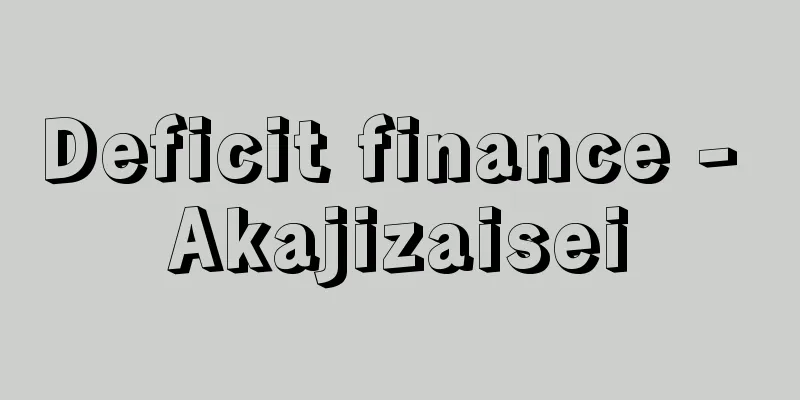Deficit finance - Akajizaisei

|
A state in which current revenues such as tax revenues are less than current expenditures and public investment. The shortfall is covered by issuing government bonds and other public debt. Traditional classical economics assumed the automatic adjustment of market mechanisms and formed an orthodox fiscal policy known as "balanced budgetism." However, Keynesian economics recognizes the significance of discretionary fiscal policy, stating that in a situation where market mechanisms do not work effectively and involuntary unemployment exists or excess demand inflation occurs, the government needs to actively adjust effective demand through deficit or surplus fiscal policy. The more inelastic private investment is to interest rates or the more interest-elastic the demand for money is, the more difficult it is to expand the economy through monetary policy, and fiscal policy is required. Also, if the money wage rate is flexible, even if there is temporary unemployment, it will eventually be adjusted by market mechanisms, but if wages are rigid due to labor union pressure or minimum wage laws, the money wage rate will not fall sufficiently even if there is unemployment, and fiscal policy is required. Furthermore, even if market mechanisms work, if their speed of adjustment is slow, people will have to tolerate unemployment for a long period of time, even if unemployment is eventually eliminated and the economy recovers, so fiscal policy is acceptable. However, doubts have recently been raised about the effectiveness of such Keynesian fiscal policy. [Tsuguo Fujino] [Reference] | |Source: Shogakukan Encyclopedia Nipponica About Encyclopedia Nipponica Information | Legend |
|
税収などの経常歳入が、経常支出および公共投資を下回っている状態。不足分はその分だけ国債などの公債発行により賄われる。従来の古典派経済学では、市場機構による自動調整作用を前提にして、財政上も「均衡予算主義」という正統主義を形成してきたが、ケインズ経済学では、マーケット・メカニズムが有効に働かず、非自発的失業が存在したり超過需要インフレーションが発生する状態では、政府は赤字ないし黒字財政によって積極的に有効需要を調整する必要があるとして、裁量的財政政策の意義を認めている。民間投資が利子率に非弾力的であったり、貨幣需要が利子弾力的であるほど、金融政策によって景気を拡大することは困難であり、財政政策(フィスカル・ポリシー)が必要とされる。また、貨幣賃金率が伸縮的であれば、一時的失業は存在してもやがて市場機構により調整されるが、労働組合の圧力や最低賃金法などにより賃金が硬直的な場合には、失業があっても貨幣賃金率は十分下がらず、財政政策が必要とされる。さらには、たとえマーケット・メカニズムが働くとしてもその調整速度が遅い場合には、やがては失業が解消し景気が回復するにしても人々は長期にわたって失業を甘受しなければならないことになるので、財政政策が容認される。なお最近、このようなケインズ主義的財政政策の有効性に対して、疑問が提示されている。 [藤野次雄] [参照項目] | |出典 小学館 日本大百科全書(ニッポニカ)日本大百科全書(ニッポニカ)について 情報 | 凡例 |
>>: Deficit bonds - akajikousai
Recommend
Dynamis
…It is translated as “reality,” “actual state,” “...
Archaeornis siemensi (English spelling) Archaeornissiemensi
...It is classified as a member of the Archaeopte...
Republic of Uganda (English spelling) Republic of Uganda
…Official name: Republic of UgandaArea: 241,040 k...
Crossandra nilotica (English spelling) Crossandra nilotica
…[Ichiro Sakanashi]. … *Some of the terminology t...
Owari family (Shiba clan) - Owarike
...The Kanrei family of the Muromachi Shogunate. ...
Wooden sickle
…Medium-thick sickles are used to cut large weeds...
Aki Region - Akichiho
... Cape Ashizuri, Tatsukushi, Oodo Beach, Okinos...
Military seal - Gunpyo
A special currency issued by the government or mi...
Opening - Kaicho
〘noun〙① At temples, statues that are not normally ...
Agriculture in mountainous areas
The term "mountainous and hilly areas" i...
Hikone folding screen
One of the early modern period's paintings of ...
Sindhu
...The 7th century Chinese monk Xuanzang stated t...
Enshoji Temple
A Tendai sect temple located near Okazaki in Sakyo...
Saburo Aizawa
1889-1936 A military officer from the Taisho to e...
boyarin
…A noble class in Russia before Peter I (10th to ...









